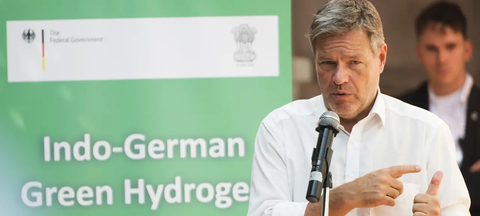Nov 08, 2024
Indo-German cooperation for green hydrogen
A strategic partnership
Germany wants to import large quantities of green hydrogen from India in future in order to accelerate its own energy transition. As part of the Indo-German intergovernmental consultations on October 25, 2024, an agreement was signed that provides for closer cooperation in the production and trade of hydrogen as well as in research.
India: an up-and-coming hydrogen producer
Federal Minister of Economics Robert Habeck emphasized that India has great potential to produce green hydrogen at competitive conditions thanks to its low electricity prices from renewable energies. India plans to build up a production capacity of five million tons of hydrogen per year by 2030, with the aim of becoming a major global exporter.
Germany relies on imports
The German government expects Germany to require 95 to 130 terawatt hours of hydrogen per year by 2030, which corresponds to over three million tons. Around 50 to 70 percent is to be imported from abroad. The new partnership with India therefore sets out a roadmap to promote trade in green hydrogen and drive forward research in this area.
A joint roadmap for the future
The Indo-German roadmap provides for the promotion of trade in green hydrogen and the advancement of research in this area. Specifically, the following measures are to be implemented:
- Infrastructure expansion: construction of terminals for hydrogen exports
- Research funding: stronger networking between scientific institutions and companies in both countries
- Technology development: promotion of innovative technologies to reduce costs
Challenges and opportunities
Despite this progress, there are concerns: critics warn that hydrogen could initially remain expensive and India may not be able to provide enough for export given its own growth. Nevertheless, the partnership represents an important step towards achieving the climate-neutral production targets of both countries and driving forward the energy transition worldwide.
In the context of the 4th Boysen-TU Dresden-Research Training Group
The interdisciplinary research in the 4th Boysen-TU Dresden-Research Training Group contributes to the development of global hydrogen value networks and thus supports the prospect of large-scale use of green hydrogen. For example, the doctoral students of Cluster G are working on the development of highly effective, precious metal-free catalysts for fuel cell technology with the aim of reducing the production costs of such systems in the long term. Cluster H focuses on the optimization of hydrogen value creation networks, among other things by analyzing the best locations for hydrogen producers and increasing the efficiency of the use of green hydrogen in concrete applications.

